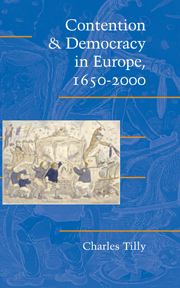7 - DEMOCRACY AND OTHER REGIMES IN EUROPE, 1815–2000
Published online by Cambridge University Press: 29 May 2010
Summary
The New York–based monitoring agency Freedom House employs an undemanding definition of democracy: civilian government competitively elected by general adult suffrage. By that standard, Freedom House retrospectively scores none of the world's 55 independent national regimes as democratic in 1900; suffrage restrictions by gender and/or property then applied in every representative regime. It evaluates 22 of 80 regimes as democratic in 1950, and 121 of 192 as democratic in 2001 (Freedom House 2002: charts; Karatnycky 2000: 7–9). For the world as a whole, it thereby claims modest democratization between 1900 and 1950, followed by enormous democratization during the 20th century's second half.
The 121 regimes Freedom House rated democratic in 2001 on the basis of competitive elections, however, included such divided, violent places as Bangladesh, Benin, Colombia, Fiji, Georgia, Haiti, the Kyrgyz Republic, Liberia, Mongolia, Niger, Sierra Leone, and Sri Lanka. None of these regimes then scored very high on our more demanding criteria of broad and equal relations with governmental agents, exercise of collective control over governmental personnel, policies, and resources, and enjoyment of protection from arbitrary action by agents of government. The world still has a long way to go before most regimes install broad, equal, protective, and effective democratic consultation. When it comes to Freedom House ratings, democracy is obviously a matter of degree.
- Type
- Chapter
- Information
- Contention and Democracy in Europe, 1650–2000 , pp. 206 - 242Publisher: Cambridge University PressPrint publication year: 2003



